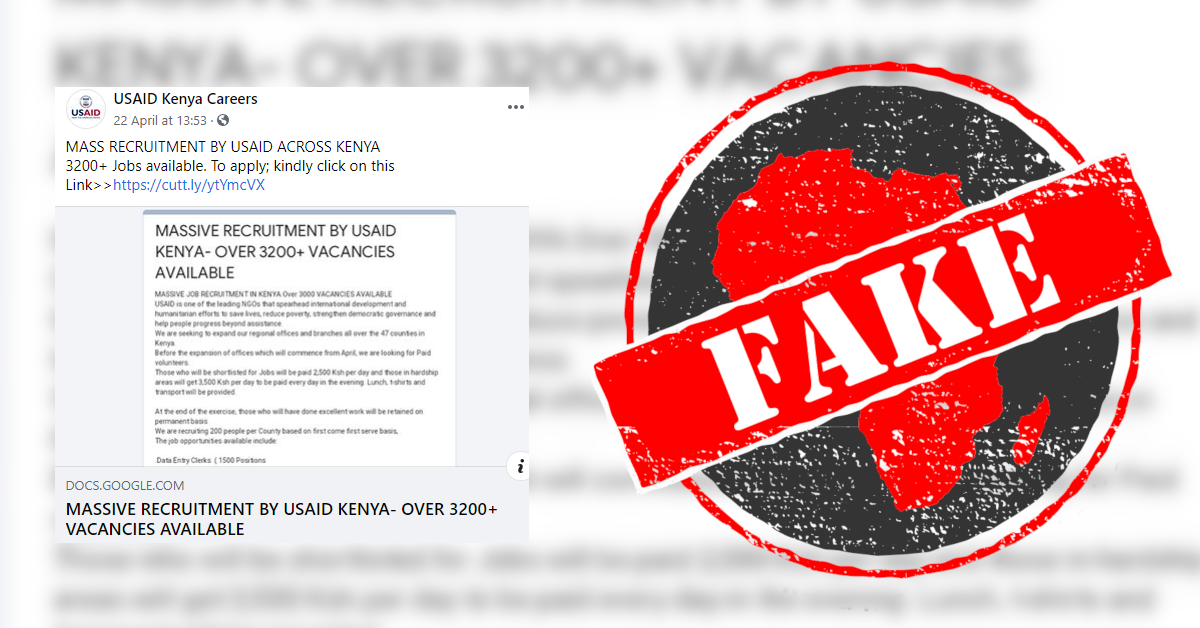A 14 January 2020 Facebook post claims to offer jobs at US Agency for International Development (USAid) in Kenya.
There is “massive job recruitment ... with over 5,000 vacancies available” in all of the country’s 47 counties, the post says.
“Those who will be shortlisted for jobs will be paid Sh2,500 per day and those in hardship areas will get Sh3,500 per day to be paid every day in the evening,” it claims.
And “those who will have done excellent work will be retained on a permanent basis”.
But the link in the post doesn’t go to the real USAid website. That’s one sign of a scam.

Another sign is that the job ad asks applicants to pay a KSh350 “registration fee”.
In December 2019 and January 2019 alone, Africa Check exposed four scam ads that tried to con people into paying KSh350 to apply for jobs that didn’t exist.
Is this another scam? Yes – and USAid confirms it.
On 20 January, USAid Kenya posted the ad on its official Facebook and Twitter accounts, with “FRAUD” stamped across it.
“They are at it again,” the agency warned. “Don’t get caught by fraudsters!! We never ask for money when you apply for a job. STOP. REFLECT. VERIFY. Spread the word.” – Dancan Bwire
There is “massive job recruitment ... with over 5,000 vacancies available” in all of the country’s 47 counties, the post says.
“Those who will be shortlisted for jobs will be paid Sh2,500 per day and those in hardship areas will get Sh3,500 per day to be paid every day in the evening,” it claims.
And “those who will have done excellent work will be retained on a permanent basis”.
But the link in the post doesn’t go to the real USAid website. That’s one sign of a scam.

‘Registration’ fee?
Another sign is that the job ad asks applicants to pay a KSh350 “registration fee”.
In December 2019 and January 2019 alone, Africa Check exposed four scam ads that tried to con people into paying KSh350 to apply for jobs that didn’t exist.
Is this another scam? Yes – and USAid confirms it.
‘Don’t get caught by fraudsters’
On 20 January, USAid Kenya posted the ad on its official Facebook and Twitter accounts, with “FRAUD” stamped across it.
“They are at it again,” the agency warned. “Don’t get caught by fraudsters!! We never ask for money when you apply for a job. STOP. REFLECT. VERIFY. Spread the word.” – Dancan Bwire
Republish our content for free
For publishers: what to do if your post is rated false
A fact-checker has rated your Facebook or Instagram post as “false”, “altered”, “partly false” or “missing context”. This could have serious consequences. What do you do?
Click on our guide for the steps you should follow.
Publishers guideAfrica Check teams up with Facebook
Africa Check is a partner in Meta's third-party fact-checking programme to help stop the spread of false information on social media.
The content we rate as “false” will be downgraded on Facebook and Instagram. This means fewer people will see it.
You can also help identify false information on Facebook. This guide explains how.


Add new comment